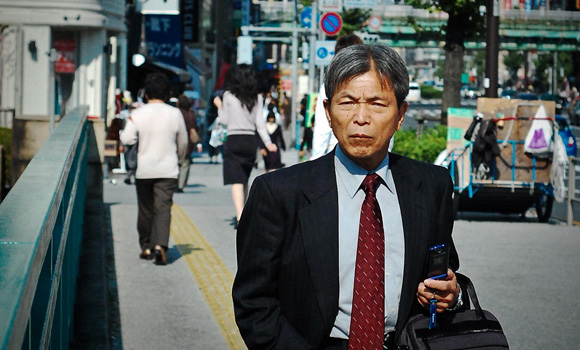Last week I talked briefly about karōshi 過労死 and the effects it has on the Japanese society. We'll take a succinct look into the institution that fosters the karōshi problem and also helped fueled Japan towards becoming a global economic identity: the Japanese career system.
Structure of the Japanese career system

In the United States, your career growth is primarily dependent on a few assets, but two of them are arguably the most important: the degree of specialization of your skills set and your performance. Typically, you develop yourself in a single market, moving from job to job, to develop specialized skills in order to move up the ladder and/or fatten up the paycheck. Your pay increases as you develop a highly specialized skill set, but eventually tapers off when you hit the limit of your progression. Your employment remains secure as long as you are productive. You have the option to jump from company to company, job to job, and obtain a position you are qualified for.
On average, an American goes through 5-8 different jobs and 3-4 different occupations in their lifetime. In other words, we are nomadic when it comes to who we work for—short-term workers in a sense.
The United States style of career progression heavily contrasts with that of Japan's.
There are a few concepts that distinguish the Japanese from the United States style of white collar career growth
- Shūshinkoyō 終身雇用 Life time employment. A hired professional under the shūshinkoyōseido 終身雇用制度 (lifetime employment system).
- Nenkōjoretsu 年功序列 Seniority by length of service. Salary is dependent on individual's status under the nenkōjoretsuseido 年功序列制度 (seniority system).
- Jinjiidō 人事異動 Constant job position changes within the company, not necessarily tailored to one's skill set.
Once out of school and hired on, the expectations are for the employee to commit themselves to the company until retirement. One life, one employer.
Requirements for getting hired by a firm are usually an excellent set of general skills, and an attendance at a reputable university under your belt (for example: University of Tokyo, Keio University, Kyoto University, etc.). No skill specialization is required early on because the company will ensure you get the training you need throughout your career. The trade-off for this is a low entry-level salary.
The loss of salary during the entry-level phase is made up later in the career. Unlike the U.S. system where salary is based on performance and specialization, the Japanese salary is increased by length of service. Late in their careers, the growth percentage of a Japanese salary tends to be greater than the U.S. counterpart. Additional benefits are also given based on length of service. For example, after reaching a certain seniority level, the employee may be offered free company paid housing near the office.
The importance of the general skill set is emphasized throughout the career of the Japanese employee. Human resources will assign the individual positions in various departments, and a lot of times the position given will in no way match their education or current skill set. In the end, the employee will be able to play out many hats and understand the company as a whole. This is great for shaping employees into managerial roles.
Promotion to a higher status position is based on length of service. Job performance and skill set are secondary when it comes to promotion time for the employee. Higher level positions tend to be filled from within. Thus, it is not easy to leave a company for another because doing so essentially resets your "seniority counter", which will stall your career growth and salary.

While it is great that experience is valued, the downfall of the seniority system is that upper level positions are filled with aged workers (the old guard), regardless of their productivity levels and qualifications. How the system is set up, firing low productivity workers is difficult. This puts younger, more capable employees at a disadvantage, since they have to wait in line behind everyone else in order to be promoted to a higher status position. In addition, having all been trained under the same system, the culture doesn't lend itself to "radical" or "outside" ideas.
On the upside, the Japanese career structure builds a strong loyalty culture amongst the company. Having everyone commit to one company in their careers and without the fear of being laid off, people tend to trust each other more. It is like being a part of a second (or third) family.
